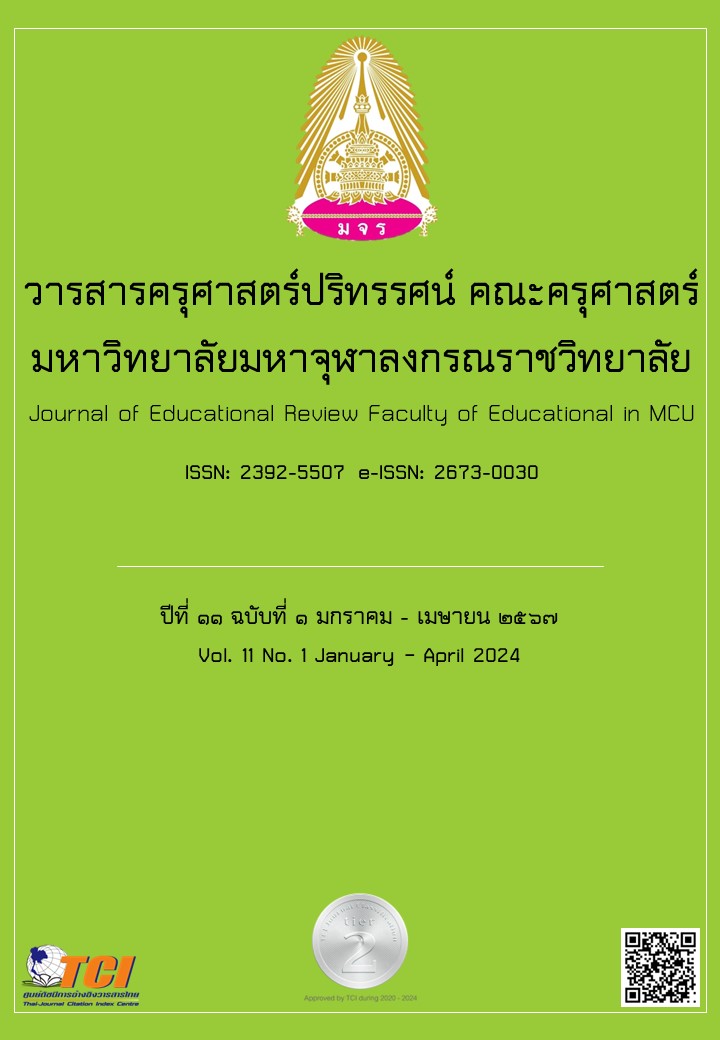THE PROCESS OF TEACHER DEVELOPMENT IN CREATIVE THINKING BASED ON BUDDHADHAMMA FOR PHRAPARIYATTIDHAMMA SCHOOL, GENERAL EDUCATION DIVISION AREA 3
Main Article Content
Abstract
The purposes of this research article were 1) to study the current conditions, problems and needs assessment for developing teachers in creativity of Phrapariyattidhamma school, general education division area 3, 2) to develop the process of teacher development in creative thinking based on Buddhadhamma, and 3) to evaluate the process of teacher development in creative thinking based on Buddhadhamma. A multiphase mixed methods research was used for research design between qualitative research and quantitative research and was divided into 3 phases. Phase 1 comprised documentary study and distribute questionnaires to the population, totaling 120 samples by using the entire population. Data were analyzed by using descriptive statistics such as frequency, percentage, mean, standard deviation and needs assessment. Phase 2 comprised interview with 9 key informants, and outline the process. Phase 3 comprised the connoisseurship with 9 experts. And content validity index (CVI) was also used for 5 experts to evaluate the process. The research results found that: 1. The highest needs assessment of each step according to the teacher development process framework consisted of step 1 should have a direct working team and work should be assigned to suit each person's abilities, step 2 should evaluate requirement of teachers and clearly plan, step 3 should be both short-term and long-term evaluations, step 4 should use words of promote, appreciate and encourage, and step 5 should encourage teachers to develop their own qualifications. 2. The process of teacher development in creative thinking based on Buddhadhamma was developed and consisted of 2 parts. Part 1 process goal, teachers had creativity according to 4 characteristics; 1) originality, 2) fluency, 3) flexibility, and 4) elaboration. Part 2 the process consisted of 1 Buddhadhamma, 2 factors, and 5 steps as follows: 1 Buddhadhamma was Iddhipāda Dhamma IV, 2 factors were 1) promote the environment and 2) opportunities of learning, and 5 steps were 1) setup, 2) idea, 3) making plan, 4) perform, and 5) assess. 3. Evaluation results of the process found that the developed process showed consensus of the process of teacher development in creative thinking based on Buddhadhamma. The assessment results of content validity index showed appropriate, accurate, possible to practice, and can be used for utilization. In summary, knowledge of this research was the PO – SIMPA Process.
Article Details

This work is licensed under a Creative Commons Attribution-NonCommercial-NoDerivatives 4.0 International License.
ทัศนะและความคิดเห็นที่ปรากฏในบทความในวารสารฉบับนี้ถือเป็นความรับผิดชอบของผู้เขียนบทความนั้นเพียงผู้เดียว และไม่ถือเป็นทัศนะและความรับผิดชอบของกองบรรณาธิการ
กองบรรณาธิการขอสงวนสิทธิ์ในการคัดเลือกบทความลงตีพิมพ์และจะแจ้งให้เจ้าของบทความทราบหลังจากผู้ประเมินบทความตรวจอ่านบทความแล้ว
ต้นฉบับที่ได้รับการตีพิมพ์ในวารสารครุศาสตร์ปริทรรศน์ คณะครุศาสตร์ มหาวิทยาลัยมหาจุฬาลงกรณราชวิทยาลัย ถือเป็นกรรมสิทธิ์ของคณะครุศาสตร์ มหาวิทยาลัยมหาจุฬาลงกรณราชวิทยาลัย ห้ามนำข้อความทั้งหมดหรือบางส่วนไปพิมพ์ซ้ำ เว้นเสียแต่ว่าจะได้รับอนุญาตจากมหาวิทยาลัยฯ เป็นลายลักษณ์อักษร
References
ฐกร พฤฒิปูรณี. (2564). การพัฒนาสมรรถนะครูในช่วงยุทธศาสตร์ชาติ (พ.ศ. 2561 - 2580). ดุษฎีนิพนธ์ปรัชญาดุษฎีบัณฑิต. มหาวิทยาลัยศิลปากร.
ทิพย์สิริ กาญจนวาสี และคณะ. (2561). วิธีวิทยาการวิจัย. กรุงเทพมหานคร: พิมพ์ทันใจ.
พรปวีณ์ คงนันทิพัฒน์ และภานุวัฒน์ ภักดีวงศ์. (2561). กลยุทธ์การพัฒนาความคิดสร้างสรรค์ของบุคลากรทางการศึกษาสำนักงานเขตพื้นที่การศึกษามัธยมศึกษา. ศึกษาศาสตร์ มหาวิทยาลัยนเศวร. 20(2). 103-111.
พระครูนิรุติวรโสภณ (วชิรเมธีวรฉัตร). (2566). กลยุทธ์การพัฒนาสมรรถนะวิชาชีพของครูโรงเรียนพระปริยัติธรรม แผนกสามัญศึกษา เขต 4. วารสารวิจัยวิชาการ. 6(4). 1-16.
พระครูพนมปรีชากร. (2562). อนาคตภาพของโรงเรียนพระปริยัติธรรมแผนกสามัญศึกษา ระหว่าง พ.ศ. 2559 - 2573. วิชาการศรีปทุม ชลบุรี. 16(1). 210-212.
พระบาทสมเด็จพระปรเมนทรรามาธิบดีศรีสินทรมหาวชิราลงกรณ พระวชิรเกล้าเจ้าอยู่หัว. (2561). พระบรมราโชวาท พระราชทานแก่คณะกรรมการคุรุสภาคณะกรรมการมาตรฐานวิชาชีพ และคณะกรรมการมูลนิธิช่วยครูอาวุโสในพระบรมราชูปถัมภ์ ณ ศาลาดุสิดาลัย สวนจิตรลดา พระราชวังดุสิต. แหล่งที่มา http://www.phralan.in.th/coronation/newsdetail.php?id=1164 สืบค้นเมื่อ 4 ก.พ. 2566.
พระราชบัญญัติการศึกษาพระปริยัติธรรม พ.ศ. 2562. (2562). ราชกิจจานุเบกษา 136. (เมษายน 2562): 12-13.
มหาวิทยาลัยมหาจุฬาลงกรณราชวิทยาลัย. (2539). พระไตรปิฎกภาษาไทย ฉบับมหาจุฬาลงกรณราชวิทยาลัย. กรุงเทพมหานคร: โรงพิมพ์มหาจุฬาลงกรณราชวิทยาลัย.
ยนต์ ชุ่มจิต. (2550). ความเป็นครู. พิมพ์ครั้งที่ 4. กรุงเทพมหานคร: โอเดียนสโตร์.
วศินี รุ่งเรือง. (2562). รูปแบบการพัฒนาครูโดยใช้การพัฒนาบทเรียนร่วมกันผ่านชุมชนแห่งการเรียนรู้เชิงวิชาชีพที่ส่งเสริมศิลปะการสอนของครู. ดุษฎีนิพนธ์ปรัชญาดุษฎีบัณฑิต. มหาวิทยาลัยนเรศวร.
วาสนา ศรีอัครลาภ และคณะ. (2559). การพัฒนารูปแบบการเสริมสร้างความคิดสร้างสรรค์ด้วยกระบวนการโค้ชทางปัญญาในงานบริหารและบริการของภาครัฐ. มหาวิทยาลัยศิลปากร ฉบับภาษาไทย สาขามนุษยศาสตร์ สังคมศาสตร์ และศิลปะ. 9(2). 339-340.
สมเด็จพระกนิษฐาธิราชเจ้า กรมสมเด็จพระเทพรัตนราชสุดา ฯ สยามบรมราชกุมารี. (2565) การประชุมวิชาการนานาชาติรางวัลสมเด็จเจ้าฟ้ามหาจักรี ครั้งที่ 4 และการประชุมวิชาการนานาชาติเพื่อความเสมอภาคทางการศึกษา. แหล่งที่มา: https://www.pmca.or.th/thai/?p=11688 สืบค้นเมื่อ 4 ก.พ. 2566.
สมหมาย ปวะบุตร. (2564). การสร้างกระบวนการโค้ชด้วยหลักพุทธธรรมของครูพี่เลี้ยงในโรงเรียนร่วมพัฒนาวิชาชีพครู. ดุษฎีนิพนธ์พุทธศาตรดุษฎีบัณฑิต. มหาวิทยาลัยมหาจุฬาลงกรณราชวิทยาลัย.
สิริชัย ดีเลิศ. (2558). การพัฒนาความคิดสร้างสรรค์ของบัณฑิตในสถาบันการศึกษา ระดับอุดมศึกษาที่มีอัตลักษณ์เชิงสร้างสรรค์. ดุษฎีนิพนธ์ปรัชญาดุษฎีบัณฑิต. มหาวิทยาลัยศิลปากร.
ฮอนด้า เข็มมา, ประยุทธ ชูสอน, และพชรวิทย์ จันทร์ศิริสิร. (2561). ยุทธศาสตร์การพัฒนาวิชาชีพครูโรงเรียนพระปริยัติธรรม แผนกสามัญศึกษา. วารสารบริหารการศึกษา มหาวิทยาลัยขอนแก่น. 14(2). 1-10.
Leedy, P.D. and Ormrod, J.E. (2015). Practical research planning and design. 11th Edition Essex Pearson Education Limited.
Uaz Haines, C. (2011). Value added by mixed methods research: A Multiphase mixed methods design. The Degree of Doctoral of Philosophy. Psychological Studies in Education. University of Nebraska-Lincoln.
William. (1970). Classroom Idea for Encouraging Thinking and Feeling. New York: DOK publishing.


